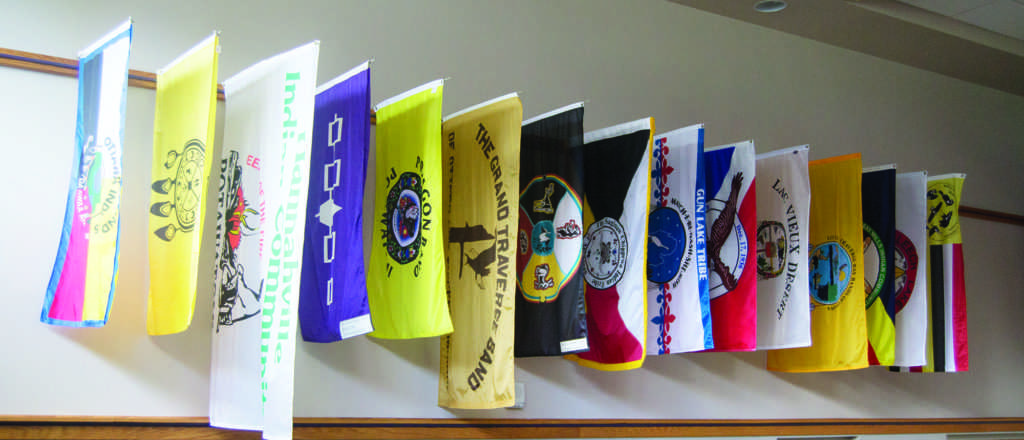After almost two years of student effort geared toward the support of the formal recognition of Indigenous People’s Day on NMU’s campus, the Board of Trustees chose not to vote on the ASNMU presented resolution during its regular meeting Friday morning.
Prior to bringing the resolution to the board, Native students collected over 500 student signatures in favor of the official recognition of Indigenous People’s Day on campus, vice president of ASNMU Connor Loftus said. Those signatures were then brought to and approved by ASNMU, which signed off on the resolution. ASNMU then presented the completed resolution to the Academic Senate where, after considerable debate, it was supported. After this, it was proposed to the President’s Council, which also supported it.
During ASNMU’s regular address to the board, Loftus addressed the members, expressing the campus community’s disappointment over the resolution not being on the meeting’s agenda.
“The resolution provides a day in which the entire campus community can partake in a civil dialogue about a particularly important and under-highlighted part of our country’s history,” Loftus said.
Indigenous People’s Day is acknowledged in many cities and universities across the country on the second Monday of October in place of what is federally recognized as Columbus Day. Indigenous People’s Day aims to celebrate the Native people who occupied the Americas before colonialism, and falls on Oct. 9 this year.
Loftus noted that NMU is not only built on Anishinaabe land but is also the first Michigan university to offer an undergraduate degree in Native American Studies. Passing Indigenous People’s Day on campus would add to these milestones by making NMU the first Michigan campus to recognize this day as a formal holiday, he added.
“We see a truly missed opportunity to unify the campus community around a center that we pride very much here on campus,” Loftus said.
Board of Trustees member Richard Popp addressed Loftus at the meeting, saying he did not see the resolution as inclusive and did not believe that voting on the formal recognition of the holiday should be a board function.
“Truly honoring the essence of inclusion, especially when or even when there are opposing views, that’s what this is all about as well,” Popp said.
Formally holding Indigenous People’s Day on Columbus Day would be exclusive to those who wish to celebrate Columbus Day, Popp said.
The resolution’s date for Indigenous People’s Day is non-negotiable at this point, Loftus said after the meeting.
“It’s a time for Northern Michigan University to take a stand and acknowledge the history―the good, the bad and the ugly,” he said.
Education on the history of genocide and exploitation of Native people surrounding Columbus is part of inclusion of marginalized people, Loftus said.
He said he thinks that further conversation with board members will be beneficial for overall conversation and that the issue is not dead.
“Columbus has his place in history and the world, absolutely, but I think, when you look at the context of his history, the entire context, what he symbolizes is colonization of a land that was already colonized by people with a deep culture, much deeper than our country’s culture,” Loftus said.
Students involved in the Native American Student Association (NASA), Native American Language and Culture Club and American Indian Science and Engineering Society (AISES) sent an email to the board, urging it to consider the resolution and providing information on why the date for the day was chosen.
“It seems to me like they’re just waiting for people who are involved to graduate so that everyone will forget about it,” NASA member Nathan Frischkorn said. “It seems like they’re ignoring the voice of both students and faculty.”
Co-president of NASA Kristina Misegan cited the innovative values of the university. She said that being on the student-lead forefront of Michigan schools is something that the board should support.
“We’ve had multiple universities in Michigan—Michigan Tech, Grand Valley State—asking us what our resolution is because they want to do this also,” Misegan said, “so wouldn’t we want to be the first ones?”































Barb Bradley • Oct 4, 2017 at 6:09 pm
Ho Wa! The NMU Board of Trustees needs some education. I highly recommend starting with a course that NMU offers, “NAS 204 – The Native American Experience.”
Like John Trudell said, speaking at NMU in January, 2003, “Columbus Day is like having Osama Bin Laden Day.”
I stand behind the Native American students, faculty, and staff. It is time to get with the program and make things right.
Barb Bradley
B.S., ICP Native American Studies, ’10
p.s. Thank you North Wind, for the well written article.